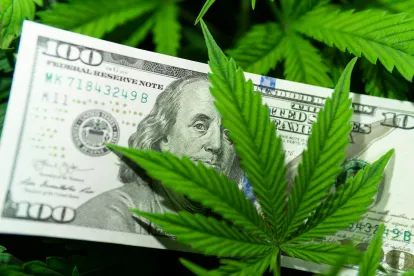One of the largest headwinds facing the cannabis industry is the lack of access to banking services. Many financial institutions refuse to serve the multibillion-dollar cannabis industry given the regulatory uncertainty created by divergent state and federal cannabis laws. The SAFE Banking Act seeks to remove these ambiguities at the federal level, clearing the path for more financial institutions to serve the cannabis industry.
Our frequent readers know this isn’t the first time we’ve written about the SAFE Banking Act (find our last article here). But once again, it seems there is renewed momentum to pass this much-needed legislation. Before we get there, we’ll provide a brief overview of federal anti-money laundering laws and how the SAFE Banking Act would modify them to make way for cannabis banking.
An Overview of Federal Anti-Money Laundering Laws
Federal anti-money laundering (AML) laws – including the Bank Secrecy Act (BSA) and its implementing regulations – are the primary impediment to banks serving the cannabis industry. These laws establish various recordkeeping and reporting requirements for national banks, federal savings associations, and agencies of foreign banks. Under the BSA, a financial institution must file a Suspicious Activity Report (SAR) when it knows, suspects, or has reason to suspect that a transaction involves funds derived from illegal activity. This would seemingly include any transaction involving funds derived from manufacturing, distributing, or dispensing cannabis, which is illegal under the federal Controlled Substances Act (CSA).
Nevertheless, federal regulators have set up an informal framework for banking cannabis through a series of guidance memoranda, which attempt to clarify when a bank must file a SAR regarding its cannabis customers. The first such memorandum came in 2013 when the Department of Justice issued the “Cole Memo.” In response to the Cole Memo and the growing number of states legalizing cannabis under state law, the Financial Crimes Enforcement Network (FinCEN) issued guidance that sought to “clarif[y] how financial institutions can provide services to marijuana-related businesses consistent with their BSA obligations” (FinCEN Guidance) in 2014.
The FinCEN Guidance requires that a financial institution engaging a cannabis-related business conduct substantial and, importantly, continuing due diligence to determine whether that business is (1) complying with state law, (2) interfering with any of the eight priorities listed in the Cole Memo, or (3) otherwise engaging in “suspicious activity,” including a list of “red flags” enumerated in the Guidance. Depending on what the institution uncovers in its due diligence, it must then file one of three cannabis-specific SARs and continue filing SARs throughout its relationship with the cannabis-related business.
Because the FinCEN Guidance is an informal guidance document that lacks the force of law, it does not immunize a financial institution from federal prosecution for banking cannabis. But many financial institutions have relied on it to provide banking services to cannabis companies. Indeed, 518 banks and 188 credit unions were providing such services as of December 2021. While those numbers seem substantial, many financial institutions have remained on the sidelines. As the American Bankers Association has explained, “without congressional action,” the “majority of financial institutions will not take the legal, regulatory, or reputational risk associated with banking cannabis-related businesses[.]”
What does the SAFE Banking Act do?
Such congressional action could come in the form of the SAFE Banking Act. The Act’s stated purpose is to “ensur[e] access to financial services to cannabis-related legitimate businesses and service providers” by removing some of the attendant legal and regulatory risks. Key aspects include:
-
Establishing that “proceeds from a transaction involving activities of a cannabis-related legitimate business or service provider” are not “proceeds from an unlawful activity,” such that processing transactions involving these proceeds will no longer constitute money laundering “solely” because the proceeds derived from cannabis.
-
Prohibiting federal regulators from terminating or limiting depository insurance solely because a financial institution provides services to a cannabis-related legitimate business.
-
Prohibiting federal regulators from taking adverse actions against, or otherwise discouraging, financial institutions from providing services to cannabis-related legitimate businesses.
-
Protecting depository institutions from civil, criminal, or administrative asset forfeiture for providing financial services to cannabis-related legitimate businesses.
-
Amending the SAR reporting guidelines for cannabis-related legitimate businesses.
-
Directing the Financial Crimes Enforcement Network to issue guidance and exam procedures for financial institutions transacting with cannabis-related legitimate businesses.
Will the SAFE Banking Act pass?
Since it was first introduced by Rep. Ed Perlmutter on March 7, 2019, the SAFE Banking Act has passed in the House of Representatives six times. It’s never passed the Senate. But bipartisan support behind the Act has steadily grown, and it has been widely reported that it could pass both chambers as a standalone measure. Senate Democrats, however, want more, and have refused to take up SAFE as a standalone bill, fearing such an incremental move would harm the prospects of more comprehensive federal reform.
That’s where the Harnessing Opportunities by Pursuing Expungement (HOPE) Act comes in. The HOPE Act would facilitate expungement of past marijuana offenses – a key social equity component of more comprehensive cannabis reform legislation. The hope (pun intended) is that the HOPE Act could be combined with the SAFE Banking Act to give SAFE the social equity component it needs to make it to the Senate floor.
This is far from the first gambit that SAFE Banking’s proponents have tried to force a vote on the Act. None have worked so far, and whether this one will is anyone’s guess. But unlike prior efforts, which have largely involved sticking SAFE into omnibus bills with bipartisan support, this effort provides what Democrats have said they’re looking for – something that helps both individuals and communities harmed by the War on Drugs and current state-legal cannabis businesses. The question now seemingly becomes whether a combined HOPE/SAFE Act will maintain the same bipartisan support as the standalone SAFE Act. And, perhaps more importantly, whether cannabis reform will remain a priority with gun reform and inflation top of mind in Washington.
Takeaways
Despite the frustrating fits and starts, many in the industry believe cannabis banking reform will happen in the near term. We’re cautiously optimistic, but we aren’t holding our breath. One thing is for sure – the SAFE Banking Act, if enacted, will be a game-changer for both the cannabis and banking industries. For financial institutions looking for new revenue streams, the cannabis industry creates new opportunities through low-cost deposits, cash-handling fees, treasury management services, and loans. Although cannabis companies will always present compliance challenges for financial institutions, those willing to invest in the infrastructure required to manage relationships with this higher-risk industry stand to reap significant rewards.





 />i
/>i
